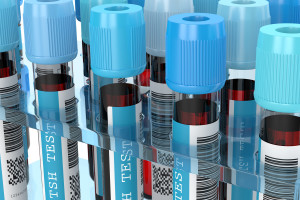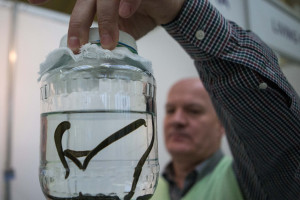Treatment of medullary thyroid cancer. Poles will be the first to use the new method in humans.

- The Medical Research Agency has announced the list of beneficiaries in the competition for non-commercial clinical trials and research experiments in the field of oncology.
- One of the projects that will receive funding is the use of the gastrin analogue CP04 labeled with Terb-161 for the diagnosis and therapy of patients with medullary thyroid cancer.
- Currently, patients with inoperable advanced forms of the disease have very limited diagnostic and therapeutic options.
Polish scientists want to develop a new, personalized diagnostic and therapeutic tool for the treatment of advanced medullary thyroid cancer using a gastrin analogue. "The goal of our research has been of interest to scientists, endocrinologists, nuclear medicine specialists, and radiopharmacists for many years, as over 90% of medullary thyroid cancer (MTC) cells overexpress the gastrin receptor," said Prof. Alicja Hubalewska-Dydejczyk from the Department and Clinic of Endocrinology, Jagiellonian University Medical College, Krakow, about the project, which received a grant from the Medical Research Agency.
In early July, ABM announced the list of beneficiaries in the competition for non-commercial clinical trials and research experiments in the field of oncology.
The project, supported by funding, opens the way to the use of radiopharmaceuticals that bind in a targeted manner to a receptor on the surface of cancer cells, thanks to the delivered ionizing radiation, selectively destroying them.
The expected outcome of the study will be the development and first clinical application of molecularly targeted therapy dedicated to patients with advanced, inoperable medullary thyroid cancer.
The consortium leader is the Jagiellonian University Medical College in Kraków. Other consortium members include the National Centre for Nuclear Research, POLATOM Radioisotope Centre in Otwock, the Maria Curie-Skłodowska National Institute of Oncology - State Research Institute in Gliwice, and the Świętokrzyskie Oncology Centre in Kielce.
Subcontracting cooperation with the Karol Marcinkiewicz Medical University in Poznań is also planned.
Medullary thyroid cancer accounts for up to 5% of all cancers. However, it is responsible for over 13% of thyroid cancer deaths.
The gastrin analogue targets the gastrin receptor present in cells, and a marker of cancer is calcitonin, a biochemical substance normally produced by paracrine cells in the thyroid gland. However, in cases of disease spread, their production is excessive.
As Prof. Hubalewska-Dydejczyk explained, cancer can most often be visualized when the calcitonin level is already very high.
- At the same time, we cannot apply surgical treatment because we cannot locate the tissue, and besides, the patient is no longer operable because he has numerous metastatic foci - she explained.
For patients with metastatic advanced medullary thyroid cancer, multikinase inhibitors are an available treatment option. However, there is no clear evidence that they significantly improve patient survival.
Selpercatinib, a receptor tyrosine kinase inhibitor, can also be used. It improves disease control in approximately 25% of patients, but it can only be used in individuals with a RET gene mutation, which is uncommon in this type of cancer. Chemotherapy, on the other hand, is ineffective.
Two in oneThe scientist emphasized the theranostic approach of the award-winning project, which integrates diagnostics and therapy, using radiopharmaceuticals for both imaging and cancer treatment. In this case, project participants plan to evaluate the efficacy and safety of the first clinical application of the gastrin analogue CP04 labeled with the radioisotope Terbium-161.
- We use a molecule that, when labeled with various isotopes, can serve as either a diagnostic or therapeutic tool, based on the molecular target, which is the expression of the gastrin receptor on the surface of medullary thyroid cancer - explained Hubalewska-Dydejczyk.
This approach is already used in medicine. "Treatment with a somatostatin analogue is popular for neuroendocrine tumors, or with PMSA for prostate cancer. Lutetium-177 is used in both situations," she added.
Why did the researchers decide to use the gastrin analogue CP04 labeled with terbium 161?
The gastrin analogue was the subject of research in COST actions ( European Cooperation in Science and Technology) , and then a multi-center study financed by the European Union, which showed that the gastrin analogue CP04 binds perfectly to the tumor cell of medullary thyroid cancer and makes the tumor foci visible, which is not achievable with other diagnostic methods.
"CP04 was then labeled with indium-111 and proved to be a sensitive and highly specific imaging biomarker. The idea of initiating a study with CP04 labeled with a therapeutic radionuclide arose at that time. For this therapy, we chose TERP-161, which is a promising radioisotope and, at the same time, has much less literature than Lutetium-171," said the professor.
It has similar properties to Lutetium-177, but in addition to emitting beta-minus radiation used in therapy, it also emits Auger electrons and so-called conversion electrons, which will most likely increase the effectiveness of treating cancer cells with ionizing radiation.
The method will be used on humans for the first timeThe study will enroll 30 adult patients with advanced, inoperable medullary thyroid cancer.
Before starting the study, each patient will undergo imaging with the gastrin analog CP04 labeled with Indium-111, due to the efficacy of this radiopharmaceutical. Each patient will then receive four courses of therapy with Terbium-161-labeled CP04. The planned follow-up period is three years to assess progression-free survival and the short- and long-term safety of the therapy.
The course of treatment will be monitored based on the clinical picture, biochemical tests, dosimetric tests and assessment of the safety of the therapy.
"The project's innovation lies in the use of a new, molecularly targeted radiopharmaceutical for personalized and precise treatment of advanced medullary thyroid cancer. This will be the first use of Terbium-161-labeled CP04 in humans," said Prof. Alicja Hubalewska-Dydejczyk.
Scientists hope to increase the effectiveness of advanced MTC treatment with an acceptable risk of toxicity, lower than with systemic therapy. For these patients, progress in diagnosis and treatment has remained limited for years.
- Over the last 20-30 years, we have neither been able to recognize patients in an earlier phase of the disease, nor has the effectiveness of treatment improved - the expert emphasized.
Copyrighted material - reprint rules are specified in the regulations .
rynekzdrowia












